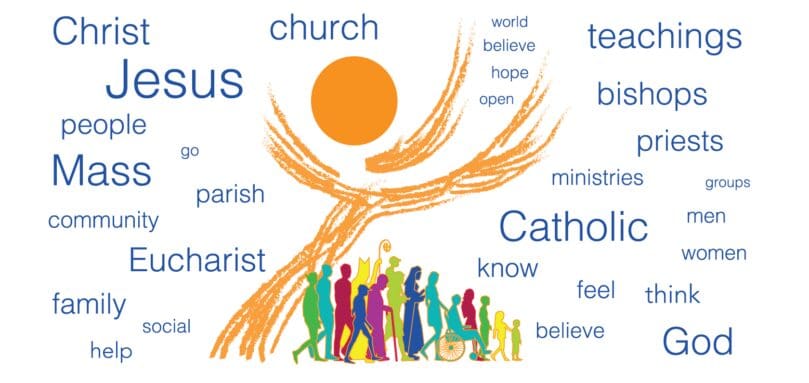
Atlanta
Atlanta’s final synod report identifies next steps
By ANDREW NELSON, Staff Writer | Published August 3, 2022 | En Español
ATLANTA—“Serving a diversity of cultures” and leading a eucharistic renewal are two of the next steps identified in the final Archdiocese of Atlanta report contributing to the 2023 Synod on Synodality.
More than 11,500 people attended nearly 350 in-person sessions while another 7,150 submitted surveys in the archdiocese to participate in the global synod, called by Pope Francis to ensure the church “is open to the voice of the Spirit.”
Organizers compiled local responses for the report sent to the U.S. Conference of Catholic Bishops. A national report will be prepared based on input from across the country, leading to sessions in Rome next year.
The report shared how the experience helped people understand the work of the Holy Spirit in a new way.
“It is hard to limit the list of joys during the diocesan phase of consultation,” it stated. Report authors wrote that “valuable moments of encounter” between believers transformed initial skepticism.
For lead organizer Jenny Miles, the face-to-face encounters made the experience worthwhile.
“There was an energy at the end of sessions, a sense that we are all in this together,” said Miles, who is manager of planning and research for the archdiocese.
The final 12-page report was posted on the Archdiocese of Atlanta website July 26.
The two remaining next steps include “emphasis on listening” and “discerning ongoing synodal structures.”
Atlanta Archbishop Gregory J. Hartmayer, OFM Conv., who attended more than a dozen regional meetings, said the listening sessions around the 69 counties of the archdiocese during late winter and spring were invaluable.
“I have been the bishop here for two years, but because of COVID, I could not do much to get out and meet people and listen to them. This synod was the perfect opportunity for me. I was so happy to be able to go to the parishes for the regional sessions,” he said in a written statement.
“I said at one of those sessions that the comments made have impacted me—they have changed me—and I meant it. I cannot be a good shepherd if I don’t know what is going on in the lives of the people in this archdiocese,” he wrote. “The report tells us a lot about the survey and the parish sessions, but I also value the comments I heard with my own ears at the regional sessions.”
Several parishes indicated the synodal experience would continue among their faith communities after the formal process is done.
And that for Miles is a reward. She said the opportunity was not focused on an end result, but the awareness of people journeying together.
“This has been a learning process and only the beginning,” she said.
The thousands of responses are organized under themes of “Mission Renewal,” “Liturgy,” “Inclusion/Exclusion/Marginalization” and others.
A key part of the report was the Catholic understanding of the Eucharist and its place within the faith. In addition to being “a source of unity and joy,” the report authors noted that many cited the sacrament as the “only reason they stay in the church—a point for further discernment.” The report said church leaders should engage with the faithful with these sentiments to understand their unhappiness and how to better minister to them.
A revival at the right time
For Archbishop Hartmayer, he believes discussions about the Eucharist at the listening sessions is well timed with the ongoing national Eucharist revival campaign. Part of the conversations at the meetings centered on the appreciation for the Atlanta Eucharistic Congress, which returned in June after being delayed for two years due to the coronavirus pandemic.
“We heard a lot about the Eucharist and how much people love the Eucharistic Congress,” he said. “This tells me that the eucharistic revival is coming at just the right time in our church.”
The national revival is an effort by American bishops to remind believers of the central teaching of the church about “the Real Presence” of Jesus in the Eucharist. More than 80,000 Catholics of all ages are predicted to gather in Indianapolis for a National Eucharistic Congress in 2024.
Cultural representation in the Atlanta Archdiocese was also featured in the report.
It indicates the archdiocese has transitioned to a majority non-white population. Nearly six out of 10 Catholics are people of color. The largest two groups of people sitting in church pews are Hispanic and white, non-Hispanic, with each having some 43% of the faith community. Masses are celebrated in 12 languages in area parishes.
According to the report, the demographics at the 2022 Eucharistic Congress reflected this reality. The Spanish-language track was standing-room only while the English track drew a far smaller number of attendees. According to the report, most of the submitted surveys from people born after 2000 were from Hispanic young adults.
There are rewards to be gained from the diversity of cultures and languages that share the same faith, but there are also pitfalls to be avoided. According to the report, many expressed a desire to experience unity within diverse cultures, but there were reports of “a common experience of isolation” worshipping in another culture. Languages and cultures that may be new to a parish can be a source of community division.
Archbishop Hartmayer said the conversations around diversity emphasize a greater awareness of hospitality.
“Our parishes have to be places where people feel welcome and appreciated,” he said. “Your parish should be a home to you.”